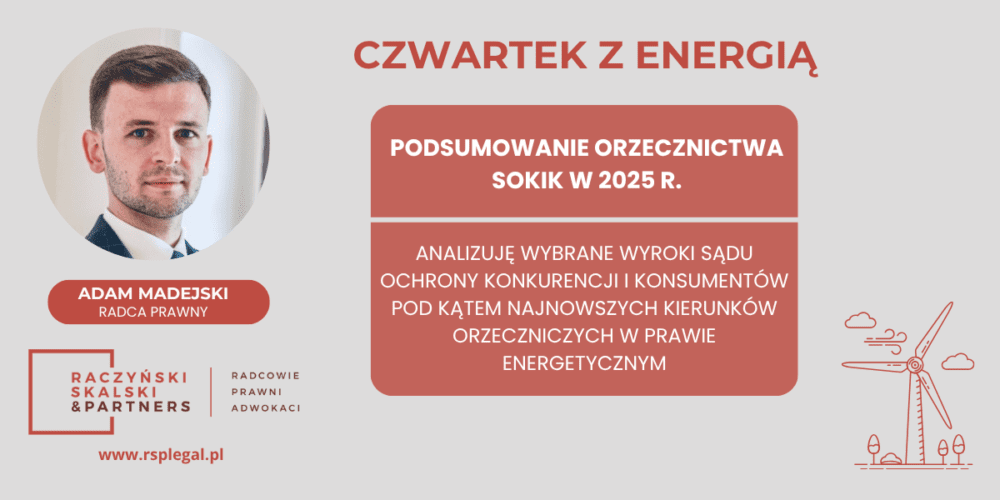As 2025 slowly draws to a close, it is worth summarising some of this year’s rulings issued by the Court of Competition and Consumer Protection. Some of the decisions presented confirm the existing line of jurisprudence, while others contain valuable positions that may have a significant impact on business decisions made by energy companies.
1. The Energy Regulatory Office must specify the obligation if it intends to impose a sanction for its violation – XVII AmE 269/23
Basis: Article 43e(1) of the Energy Law
Description: An entrepreneur holding a licence to trade in liquid fuels was accused of violating the obligation to provide information on the type and infrastructure used to conduct licensed activities, specifically that the information provided was misleading.
The penalised entrepreneur argued that he had submitted a list of vehicles (tankers) together with his licence application and had subsequently updated it in accordance with the required templates. However, the Energy Regulatory Office (URE) found that the ‘current’ list was incomplete and imposed a financial penalty on that basis. The entrepreneur lodged an appeal, claiming that he had not violated his statutory obligation, but that the information provided may have been ‘incomplete’.
The court ruled that there had been no violation, as the entrepreneur had fulfilled his obligations correctly, i.e. he had updated the information on the vehicles in accordance with the required templates. If the Energy Regulatory Office expected a complete list of vehicles to be submitted, it should have specified this clearly in its request. However, since it did not do so, it could not impose a financial penalty on this basis.
Conclusions: When making allegations against a licensed entity, the Energy Regulatory Office should specify in the request what it expects from that entity. If it fails to exercise due diligence in this regard and the entity has fulfilled its obligations, there are no grounds for imposing a penalty.
2. The liability of entities under energy law is objective (and that’s that!) – XVII AmE 13/24
Basis: Article 56(1) of the Energy Law
Description: The penalised entrepreneur requested that the penalty be waived on the grounds of no fault in the breach of statutory obligations. The ruling in question upheld the prevailing line of jurisprudence, according to which the issue of fault is not taken into account when assessing a violation of energy law provisions, and since there has been a violation of obligations or provisions, it is reasonable to impose a financial penalty. The Court of Competition and Consumer Protection (SOKiK) took a similar stance in case no. XVII AmE 162/24, emphasising that a professional entity holding a licence issued under energy law should meticulously verify the scope of its obligations and fulfil them. Interestingly, in another case, no. XVII AmE 201/ 23, the court even described the entity’s motivation as reprehensible and the violation of energy law as intentional, as the punished entrepreneur argued that it would be practically impossible to verify on an ongoing basis whether its contractors held licences, given the scale of its operations.
Conclusions: A request to waive the penalty or impose the minimum penalty will only be justified if the statutory conditions are met. Invoking the absence of fault is unfounded, as it is uniformly accepted that the liability of entities under energy law is objective, i.e. independent of fault.
3. The dispute before the Court of Competition and Consumer Protection is adversarial, so allegations based on a violation of the Code of Administrative Procedure will not be effective – XVII AmE 163/24
Basis: formulation of allegations of violation of the Code of Administrative Procedure in an appeal against a decision
Description: The appellant, who was fined, raised (among other things) allegations concerning the improper conduct of the evidentiary proceedings by the Energy Regulatory Office (URE). As a result, this was one of the grounds for the motion to overturn the decision. The Court of Competition and Consumer Protection unequivocally found these allegations to be unfounded, as the proceedings initiated as a result of the appeal are civil proceedings, and the President of the Energy Regulatory Office acts as a party in them, and the Court is a court of first instance, conducting a comprehensive assessment of the case ‘anew’. Potential violations of administrative procedure therefore have no direct impact on the effectiveness of the appeal, as the case before the Energy Regulatory Office is, in practice, being re-examined by the Court of Competition and Consumer Protection.
Conclusions: The court clearly indicated that challenging the decision of the President of the Energy Regulatory Office on the basis of allegations of violation of the Code of Administrative Procedure cannot lead to the revocation or annulment of the decision, because in proceedings before the Court of Competition and Consumer Protection, the President of the Energy Regulatory Office has the status of a defendant and does not act as a public administration body within the meaning of administrative procedure, but as one of the parties to an adversarial dispute.
4. If an entrepreneur does not perform a licensed activity and does not generate income from it, this does not mean that a financial penalty cannot be imposed on them – XVII AmE 163/24
Basis: Article 56(3) of the Energy Law
Description: The penalised entrepreneur argued that he did not conduct any licensed activity and did not generate any income from it. In light of the provisions of Article 56 of the Energy Law, he cannot be fined for a violation related to the non-payment of a substitute fee for certificates of origin, because the amount of the fine is based on the revenue generated from licensed activities. Since no such activities were carried out, no fine can be imposed.
The Energy Regulatory Office took the opposite position, pointing out that the entrepreneur had not provided current financial data despite requests, and as a result, the Office used the data it had as a basis for its calculations and imposed the minimum penalty, calculated using a formula. At the same time, the Energy Regulatory Office emphasised that if the lack of revenue prevented the imposition of a financial penalty, the statutory regulation would be ‘empty’ and would contradict the very purpose of sanctions. The Court of Competition and Consumer Protection shared these conclusions, indicating that since the energy law provides for a minimum penalty, in the absence of revenue, it is reasonable to impose the minimum penalty or a higher penalty if justified by the circumstances of the case.
Conclusions: The cessation of licensed activities and, as a consequence, the failure to generate revenue from them does not make it impossible to impose a penalty, since the regulations provide for a minimum amount.
5. Declaration of bankruptcy is not a ground for waiving a financial penalty
Basis: Article 56(6) of the Energy Law
Description: The penalised entrepreneur argued that the fiscal function of the penalty would not be fulfilled because, due to the declaration of bankruptcy, the penalty would not be enforced. It is therefore reasonable to waive the penalty. The Energy Regulatory Office adopted a different interpretation based on the principle that public administration bodies are bound by the provisions of law – since the provisions of law on which the imposition of a financial penalty is based do not provide for an exception in the form of bankruptcy, the penalty should be imposed (provided that the material conditions for doing so are met). The court shared the position of the URE, pointing out that the potential inability to enforce the penalty, including due to bankruptcy, is not a ground for exemption from liability or for waiving the penalty. Furthermore, accepting the position of the penalised entrepreneur could set a dangerous precedent. The Court of Competition and Consumer Protection supported its position with the case law of administrative courts concerning tax liabilities.
Conclusions: Declaring bankruptcy does not exempt from liability for violations and therefore does not constitute grounds for waiving the penalty.



